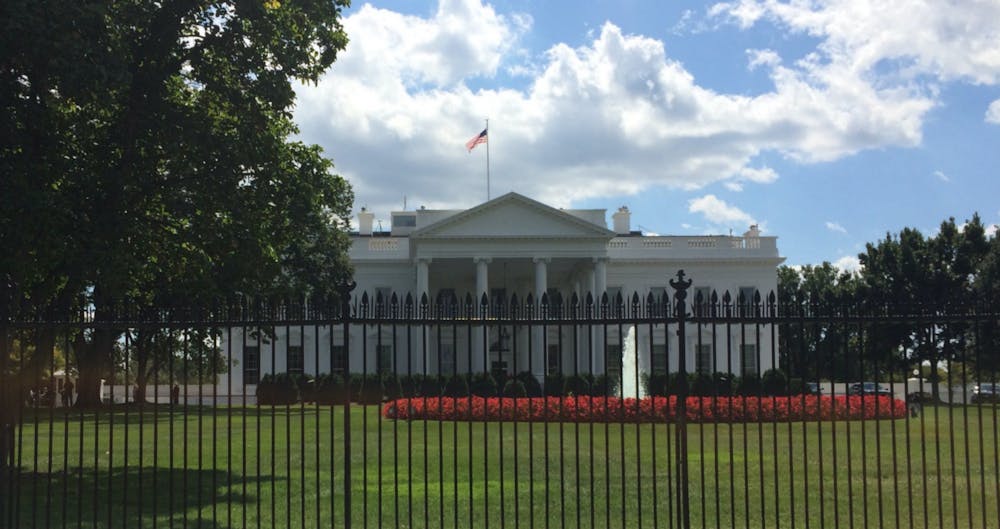The unexpected fear that grips international students during a time of political turmoil is unlike any other.
Elena Arango vividly recalls how she felt while traveling between the United States, where she studies at American University, and her home country of Colombia. Then-President Donald Trump’s administration enacted some of the strictest immigration policies to date. His policies and rhetoric about immigrants instilled fear among many international students.
One incident in 2019, when Arango was returning to the U.S. for her sophomore year at AU, stands out as particularly frightening. When security discovered that she was missing one element of her student visa upon arrival, she was threatened with deportation.
“I was detained at the port of entry … I said, ‘I have the proof that I’m enrolled as a full time student. My transcript, my payment, I’ve done everything,’ but I didn’t know about that signature. No one told me,” said Arango, now a junior in the School of Communication.
When an officer at the airport took her to a detainment room, which was paneled with one-way mirror glass, he told her, “‘We will maybe have to deport you back,’” she said.
Eventually, Arango called International Student & Scholar Services at AU, which provided her with a lawyer to confirm to the officer that she was in fact a full-time student with a student visa.
Arango wasn’t aware that the ISSS provides lawyers for students in situations like these.
“I didn’t know I had a lawyer,” she said. “I didn’t know that I was ever going to need a lawyer.”
However, the ISSS is subject to executive orders passed by the U.S. Department of Homeland Security. Often, they’re thrust into the position of needing to quickly respond to and communicate with students about policies that are enacted, most notably, the Trump administration’s travel ban.
Senem Bakar, the director of ISSS, remembers the date the ban was issued: Jan. 27, 2017, a Friday morning on which the Trump administration released an executive order placing strict travel restrictions on individuals traveling to the U.S. from several Muslim-majority countries.
“The very first thing I did as soon as I saw that executive order was ran a quick list of our enrolled students to see who we have from those countries, and how many students would be impacted,” Bakar said.
She remembers the following week being filled with town halls and contacting lawyers, trying to help students navigate the fallout from the order.
Bakar said government policies affect the lives of every student. She mentioned one student who lost a brother but was unable to return home for his funeral, as she’d have been prevented from reentering the U.S. to continue her studies. Bakar cited many such examples.
“While the president has lots of power, generally speaking, he has more power in the realm of immigration,” said Amanda Frost, a professor at AU’s Washington College of Law who specializes in citizenship and immigration law, among other areas.
Sparsh Goyal, a freshman in the School of International Service, lives in South Korea. He is considered a “global nomad” at AU, meaning that he has U.S. citizenship but lives abroad. While Goyal hasn’t had struggles with citizenship, he has the experience that comes with traveling in and out of the U.S.
“We are very strict, in comparison to other countries,” Goyal said in reference to immigration policies.
“I do think that there is a lot of inconsistency in the way that it’s enforced and in the way that it’s understood by those who are by those who it affects, especially to immigrants who are on the poor side,” he said. “It’s a large threat to them to go into immigration without knowing exactly what they’re getting into.”
Ana Camargo, a junior in SIS and CAS, has traveled between the U.S. and Colombia, similar to Arango. On top of the stress of being an international student, she also deals with the culture shock and creation of a new identity that comes with moving to a new country.
“You have to code-switch very quickly. You have to become very proficient with two different lifestyles,” Camargo said, referring to the act of linguistically switching between dialects and cultures. “You start becoming like someone that has to kind of decide where you belong.”
Camargo has observed how intertwined culture and politics are in the U.S.
“That’s also a transition that I believe every international student goes through, those changes that obviously have an impact on politics and their own professional lives,” Camargo said.
Despite what occurred during the Trump administration, President Joe Biden claims to have a more progressive policy on immigration, with both his language and policies. Biden reversed Trump’s “Muslim ban” on his first day in office.
“That will, I think, also encourage more students to come,” Frost said.
Camargo has hope about the change from Trump to Biden and how international students are affected by policy.
“Thank God that with the Biden administration that's something that’s changing,” she said.
Arango feels relieved at Biden’s election.
“It was a relief for me. When this change of presidency happened,” she said. “I feel that right now I am much more welcome in the United States.”





